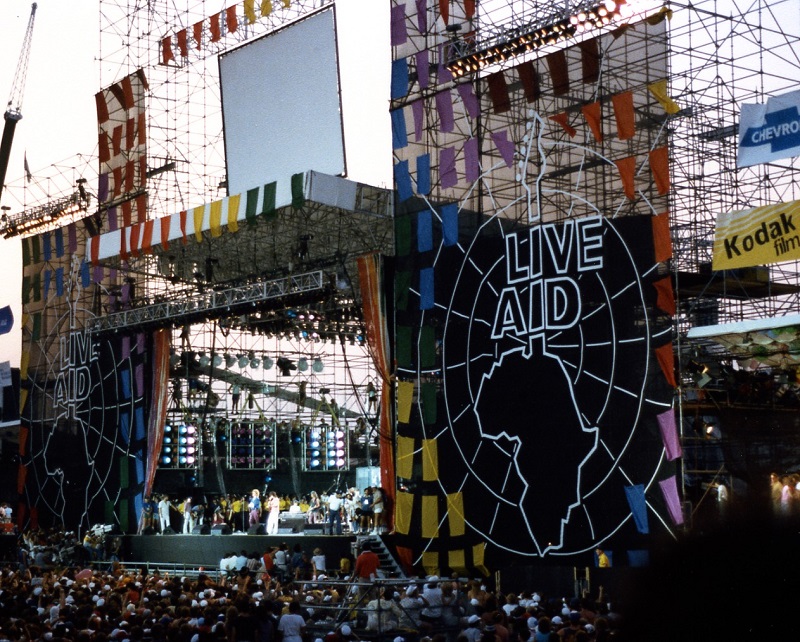On July 13, 1985, Phil Collins made music history by doing something no one had ever done before (and likely hasn’t done since). He was the only performer to appear live at both Live Aid concerts, in London and Philadelphia, on the very same day.
Phil Collins: Everywhere at Once
By the mid-1980s, Phil Collins had become a global phenomenon. As both a solo artist and member of Genesis, he had racked up chart-topping albums, hit singles, and sold-out tours across the world. His third solo album, No Jacket Required, had taken 1985 by storm, dominating airwaves and topping the charts in multiple countries.
So it was only fitting that on July 13, 1985, a day described as “the greatest day in the history of pop music”, Phil Collins would also be everywhere — quite literally.
Making Rock History
Collins pulled off what seemed impossible: he performed live on global television from two different continents in a single day. And it was not for fame or headlines, it was for a cause. Live Aid, organized by Bob Geldof, aimed to raise funds for famine relief in Ethiopia. Like the Band Aid single “Do They Know It’s Christmas?” the year before, the event brought together some of the biggest names in music for one shared purpose.
While many artists participated, the day belonged to Phil Collins.
Live Aid: The Event
Live Aid was the natural successor to Band Aid. Geldof had rallied the stars once again, this time for two simultaneous mega-concerts, one at Wembley Stadium in London, the other at John F. Kennedy Stadium in Philadelphia. Almost every major pop and rock act of the 1980s took part.
Collins had previously played drums on the Band Aid single, but didn’t sing on it. His record label had advised him to hold off singing publicly, so as not to distract from the release of No Jacket Required and its upcoming tour. That changed with Live Aid.
July 13: A Day to Remember
Collins began his day at Wembley Stadium in London. In the early afternoon, under a blazing sun, he sat alone at the piano and performed “Against All Odds” and “In the Air Tonight”.
‘lt was blisteringly hot, the white stage. lt was so hot and l made a terrible mistake on ‘Against All Odds’ on the piano’, Phil later recalled. ‘l thought, ‘Oh God, what a good start for the day this is.”1
The bum note was heard not only by the 80,000 people at Wembley, but by over 1 billion viewers watching around the world.
He was then joined by his friend Sting for a duet of “Long Long Way to Go”, a track from No Jacket Required (Sting had sung backing vocals on the original), followed by a performance of “Every Breath You Take”.
From London to Philadelphia
Collins left Wembley, jumped on a Concorde, and flew across the Atlantic to perform at the Philadelphia show just a few hours later. He recreated his solo set and also played drums for both Eric Clapton and the reunited Led Zeppelin.
He arrived at JFK Stadium at around 7:00 p.m., asked Eric Clapton what they’d be playing, and by 7:30 p.m., he was onstage with him. Somewhere in between, he even found time to visit Robert Plant’s trailer for a quick chat before their Led Zeppelin set.
It was a whirlwind. But it perfectly captured the tireless energy of Phil Collins in the 1980s.
The Legacy
By 1985, Collins was already a global star. But performing at both Live Aid concerts catapulted him even further, cementing his status as a worldwide icon and consummate showman. His double appearance was not only a technical and logistical feat, but a powerful symbol of the unity and urgency behind Live Aid’s mission.
Live Aid: In Hindsight
While Live Aid is remembered for its good intentions, it’s also seen — in retrospect — as a bit of a cliché: wealthy Western musicians trying to “save” Africa with rock music. The lyrics of Do They Know It’s Christmas? have been criticized for their colonial tone and stereotypes. Still, the event did raise enormous funds and global awareness for the crisis in Ethiopia.
Phil Collins didn’t just participate in the day, he helped define the moment. His double appearance remains one of the most talked-about achievements of Live Aid, and one of the most iconic performances in rock history.
Title photo: Live Aid at JFK Stadium, Philadelphia, PA. Source: Wikimedia Commons, own work. Author: Squelle. / CC-BY-SA-2.5 (https://creativecommons.org/licenses/by/3.0).
- Phil Collins – A Life Less Ordinary (Documentary – 2002) ↩︎


Thanks for another great post.
Cheers!